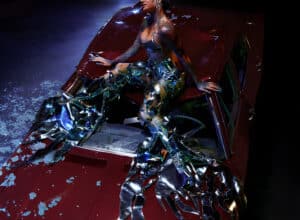Released: 2014
Kehlani’s song “FWU” is a love letter to loyalty, resilience, and the hustle required to make it out of tough circumstances. The lyrics highlight a narrative of two people bound together through thick and thin, appreciating each other’s unwavering support and the unspoken understanding they share. Kehlani’s depiction of struggle and partnership sheds light on a love that’s built on more than just attraction—it’s about loyalty, reliability, and shared goals.
The song kicks off with Kehlani reflecting on her and her partner’s rise from nothing, which sets the stage for the themes of struggle and perseverance that are woven throughout the song. “Came up from nothin’ / Had to start hustlin'” speaks to their shared past, a testament to the grind they both had to endure. The lyrics convey the reality of growing up with limited means and the necessity of hustling just to survive and hopefully thrive one day.
The hook is an ode to loyalty—it’s clear, repetitive, and catchy: “He said he loves me, ’cause I’m loyal, loyal / Put none above me, ’cause I’m loyal, loyal.” Kehlani repeats this mantra to emphasize how central loyalty is in her relationship. This repetitive phrase cements loyalty as not only the crux of their bond but also the reason they’re in each other’s lives despite the hardships.
The first verse continues with the tale of financial struggle, noting a childhood marked by poverty: “Mad at his mama / ‘Cause she couldn’t buy Jordans / His mama was poor / Yeah, she could never afford it.” This narrative piece tells the story of a young boy’s frustration with financial constraints, painting a picture of wanting to have what others have and the drive to escape these limitations.
The following lines highlight the tight-knit nature of their community: “Kids on the come up / You know we stick together.” This suggests a support system amongst peers, united in the struggle and striving for something greater together. The lyrics suggest that their youthful hustle has a short shelf-life—”It’s cool while you young / But you can’t do it forever”—pointing to the need for long-term planning and smart moves to escape their circumstances.
Kehlani shows appreciation for her partner’s hard work and loyalty in the second verse, “Made you some breakfast / Bank account statements / Yeah, I already checked it,” signifying that she values acts of service and attentiveness as demonstrations of loyalty. Here, Kehlani plays the supportive role, managing household tasks and celebrating her partner’s grind with “You love when I handle shit / I already get it.”
Her reference to cultural background is notable with, “He tells me he loves me / He says mami te quiero / Papi’s a hustler / Chasing mucho dinero,” which hints at a bilingual relationship and highlights the diverse tapestry of cultural influences in her music. It’s a testament to how their cultural heritage and mutual understanding build the bond between them, particularly through shared values like hard work and ambition.
Kehlani shifts to discussing the sustainability of their love over time. She touches on the theme of perseverance, noting that “Years down the road / When up on out the projects / Baby we’re like rockets / Lovin’ what we started.” This powerful imagery portrays their relationship as not just enduring but soaring, thanks to the foundation they’ve laid together. The “projects” is often a reference to public housing, indicating an intention to move beyond socio-economic barriers.
The chorus further cements the commitment both partners have to each other. By using the slang “fuck witcha” and “fuck witchu,” Kehlani uses an urban vernacular to emphasize the raw, authentic bond that connects them, which goes beyond the superficial into genuine partnership.
Overall, “FWU” is more than just a song about romance. It is an anthem about growth, mutual respect, and the tenacity needed to overcome life’s challenges. Kehlani brilliantly captures the spirit of young love molded by shared struggles and future aspirations. Through this narrative, she reinforces that real love is fortified through loyalty and collective strength—a timeless theme resonant in the context of many listeners’ lives.








